Z is more than just a letter to a dedicated fan base of car enthusiasts, my family among them. My Uncle Robert (known as Unc) owned every model of Z, except the 260, until he died of cancer in 1997. His blue-on-blue 1990 300ZX 2+2 now sits in my garage and my kids ride in the back seat like I once did with Unc behind the wheel.
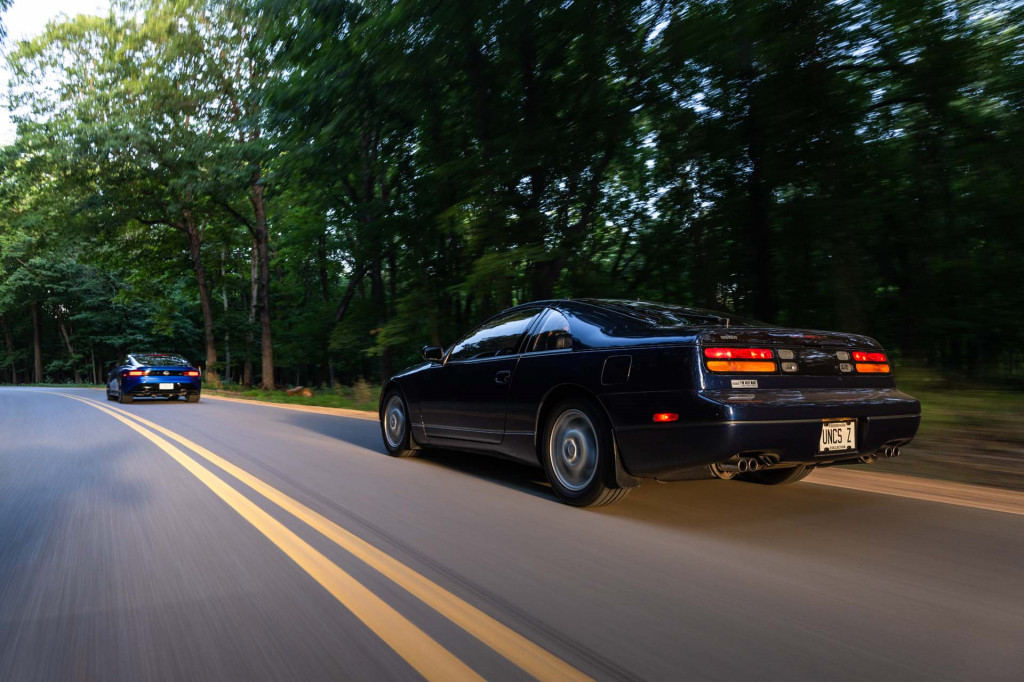
1990 Nissan 300ZX and 2023 Nissan Z I Photography by Allex Bellus Photography
The Z lives on with a new generation for 2023 thanks to dedicated enthusiasts within Nissan. It’s not a secret the new Z is based on the previous Z34 generation. On paper, the changes made to the Z fix the issues of the 370Z (and 350Z) while also rekindling enthusiasts’ desire to own the iconic Japanese sports car. I hadn’t driven it yet, though, so I reserved judgment until I could get behind the wheel.
Recently, I spent a long weekend comparing and contrasting the 2023 Nissan Z with my family’s 1990 Z32 300ZX, and here’s where I landed on where the new car hits and where it misses.
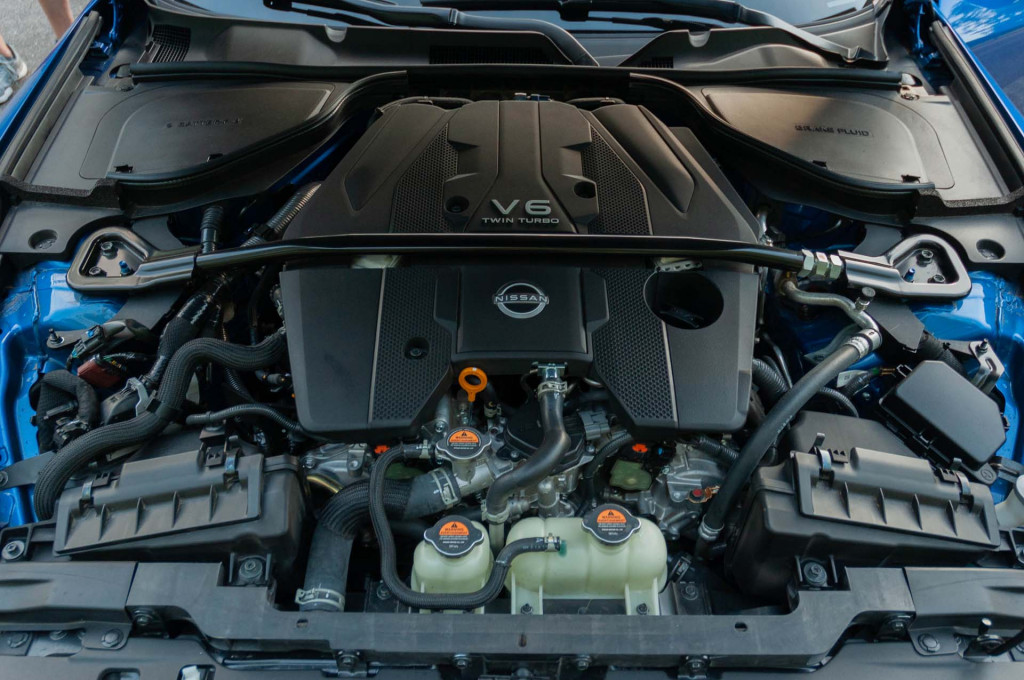
2023 Nissan Z
Hit: The Z is turbocharged, again
After a two-plus-decade hiatus, turbochargers are once again bolted to the Z’s engine. The outgoing 3.7-liter V-6 has been replaced by the Infiniti Q60 Red Sport’s twin-turbo 3.0-liter V-6 rated at a healthy 400 hp and 350 lb-ft of torque. The last twin-turbo Z from the ’90s lit up like a firecracker when the turbos kicked in all the way up at 4,500 rpm. The new Z has a more modern feel, but also a character of its own. Most modern turbocharged engines deliver their power immediately and the torque stays at the ready for much of the rev range. In the 2023 Z, torque comes on low and the horsepower builds as the revs climb, with the best power coming on at around 3,600 rpm. With the 6-speed manual, judicious shifting is required to keep the engine on boil. Go into a corner in too high a gear or with too few revs and you’ll be out of the power band when exiting the corner and have to immediately downshift or wait for the power to build. If you want ready power at all times, this isn’t the engine for you. If you want a naturally aspirated feel with pull through the entire rev range, you’ll be happy. I was happy as the power built in similar fashion as the naturally aspirated VG 3.0-liter V-6 in the family’s 1990 300ZX.
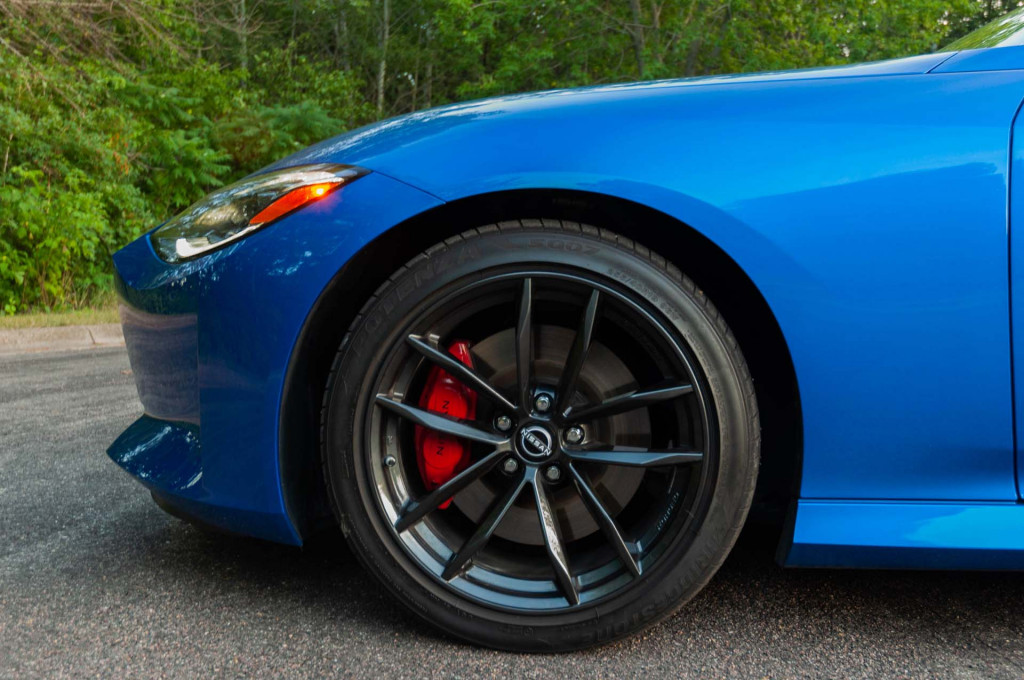
2023 Nissan Z
Miss: Ugh, Potenzas
The 2023 Z Performance model comes standard with Bridgestone Potenza S007 tires sized 265/40R19 in the front and 275/35/R19 in back. While they might “grip hard” on the track, according to our first drive review, they are a disappointment on the street. Even with the Performance model’s limited-slip rear differential, the tires struggle to put the power down on dry pavement. On the highway, the Potenzas are loud, though they don’t tramline. They feel hard and aren’t progressive in the way they give up grip around a corner. In the wet, they feel twitchy and unstable on the highway, and have little grip around corners. A different set of tires would be my first order of business if I were to buy a Z. Though, oddly I have a desire to experience the new Z on the base 18-inch wheel and tire package as it’s a square setup like our 300ZX.
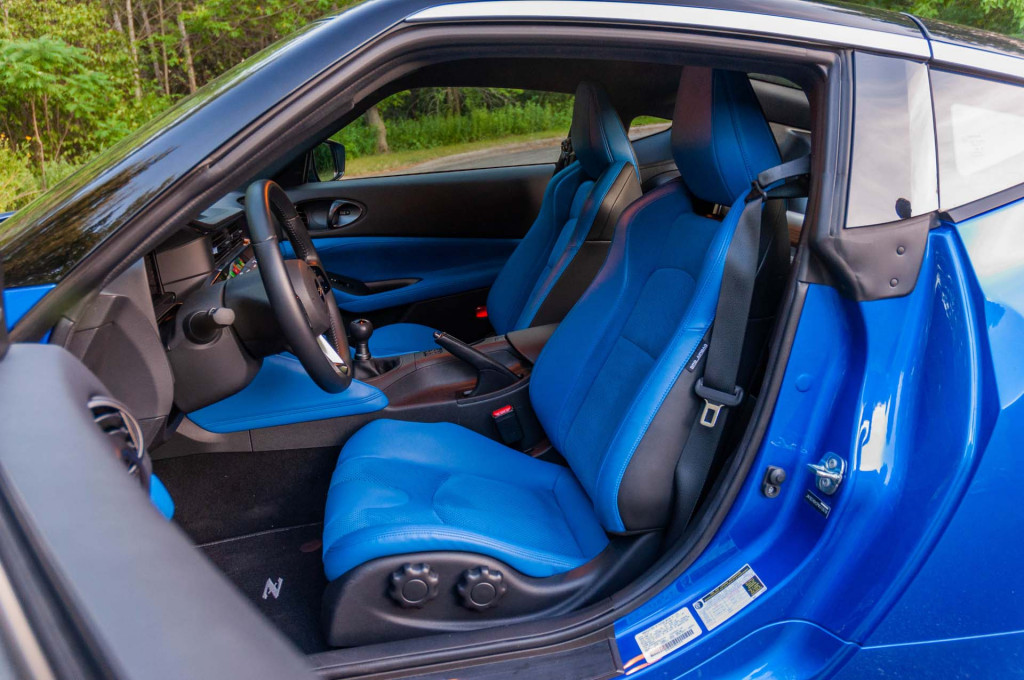
2023 Nissan Z
Hit: Nissan fixed the seats
The seats were among the most annoying things (and there was a long list) about the 370Z. When a head hit the headrest, the mounting rods connecting the head rest to the seat would push into the middle of the occupant’s back like some sort of medieval torture. The 2023 Z’s updated seats have revised padding and the headrests can now be used without issue. Small silly things can make a big difference.
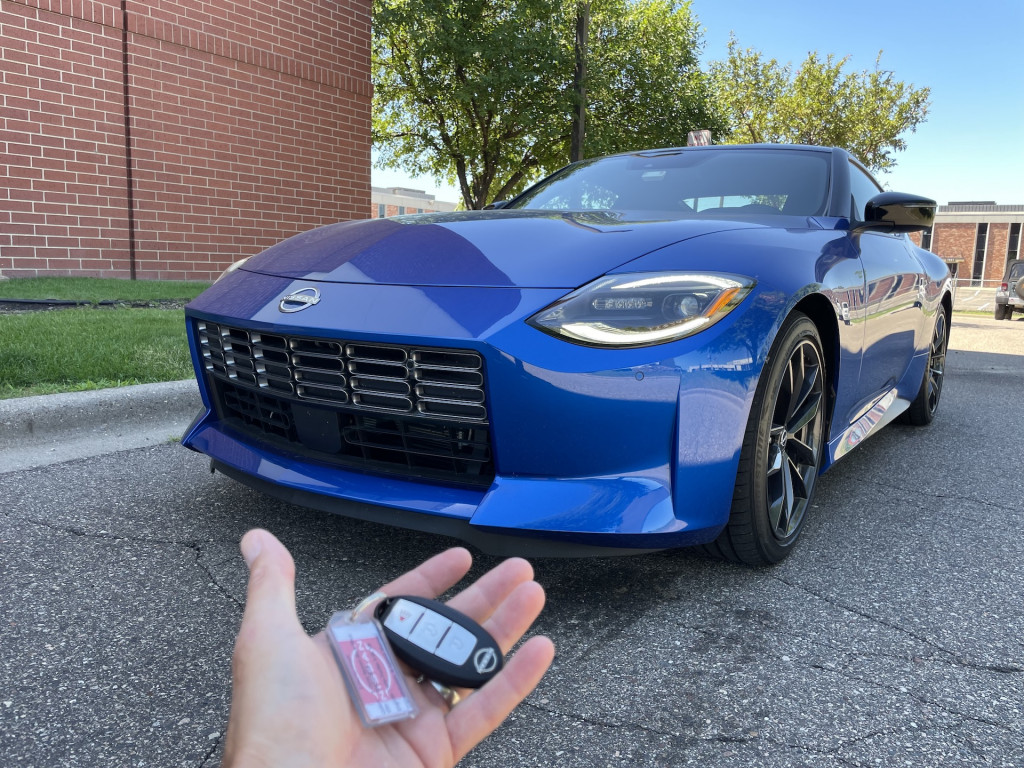
2023 Nissan Z
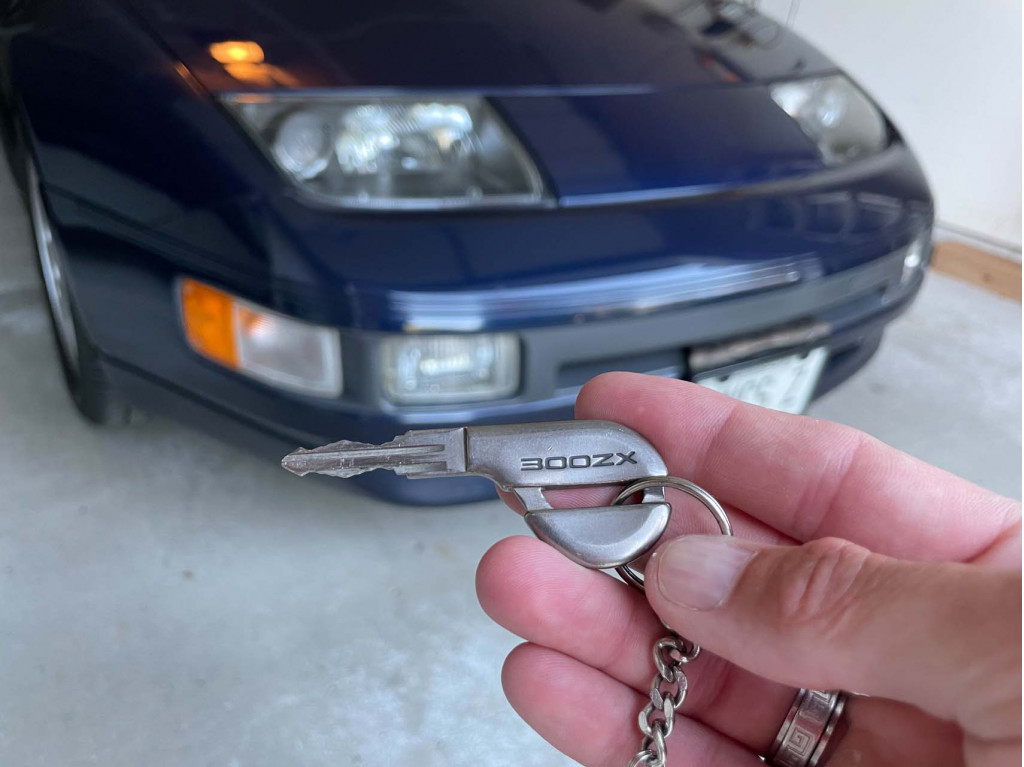
1990 Nissan 300ZX
Miss: Initial impressions are everything
Nissan went to great lengths to change the look of the latest Z. A lot of it pulls from the 240Z and 300ZX playbooks. The Z32-generation 300ZX experience began with the master key, which was made out of titanium. It was a true pain in the butt to replace, but it was heavy in the hand or pocket, and it felt special. The new Z’s key is the same suppository-shaped fob as a you get with a 2012 Altima rental car. Worse, the 370Z’s key, which was essentially the same, at least had a Z on it. The new one? Just the new corporate Nissan logo. This isn’t special. I want it to be.
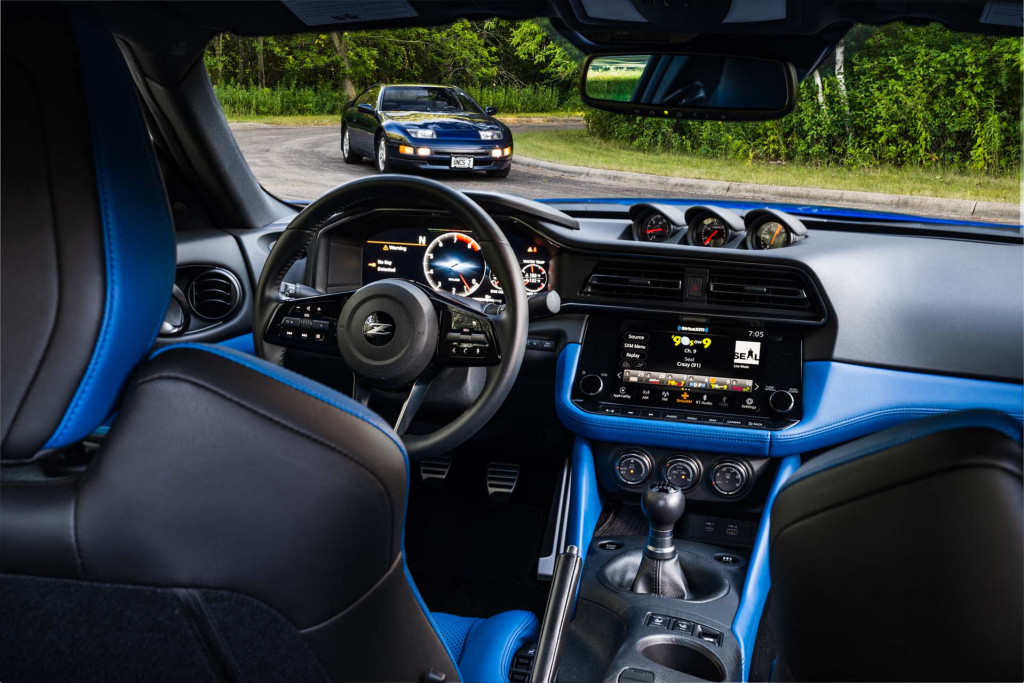
1990 Nissan 300ZX and 2023 Nissan Z I Photography by Allex Bellus Photography
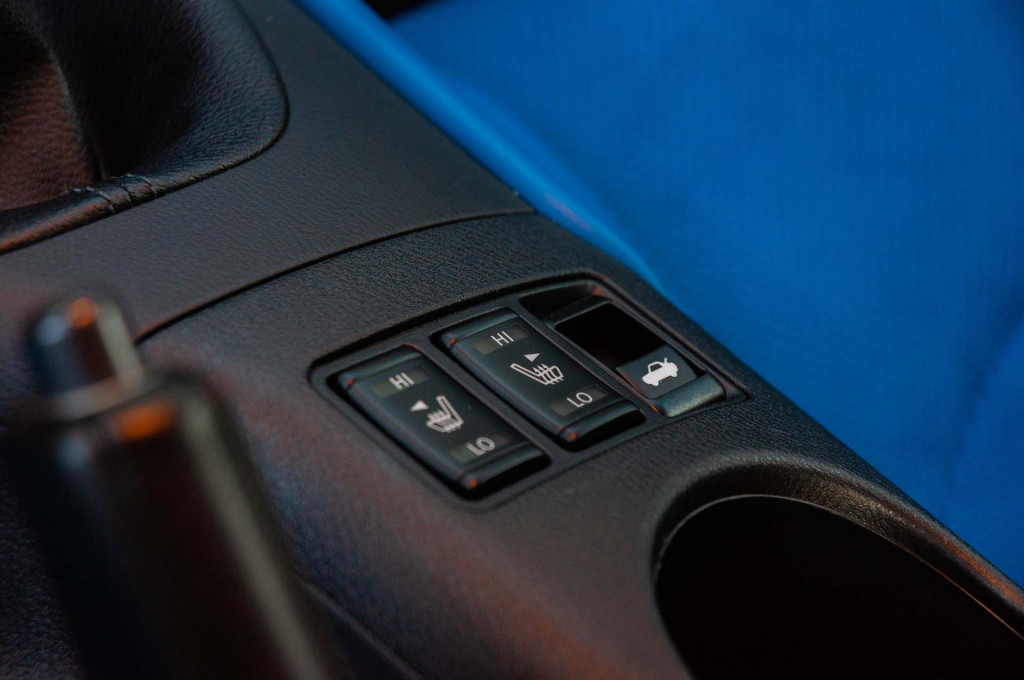
2023 Nissan Z
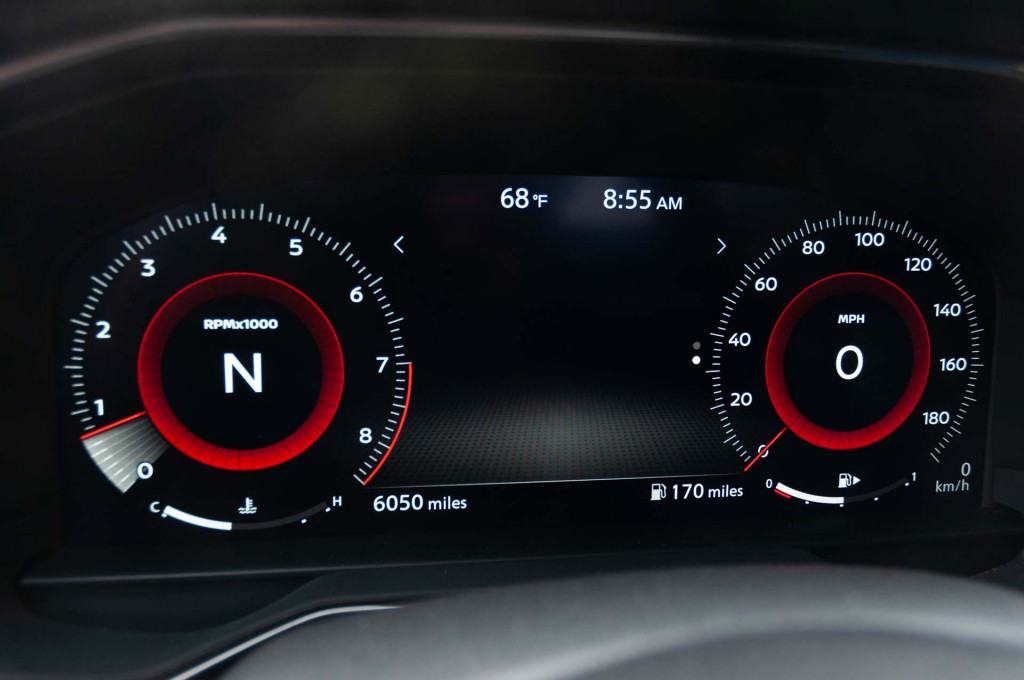
2023 Nissan Z
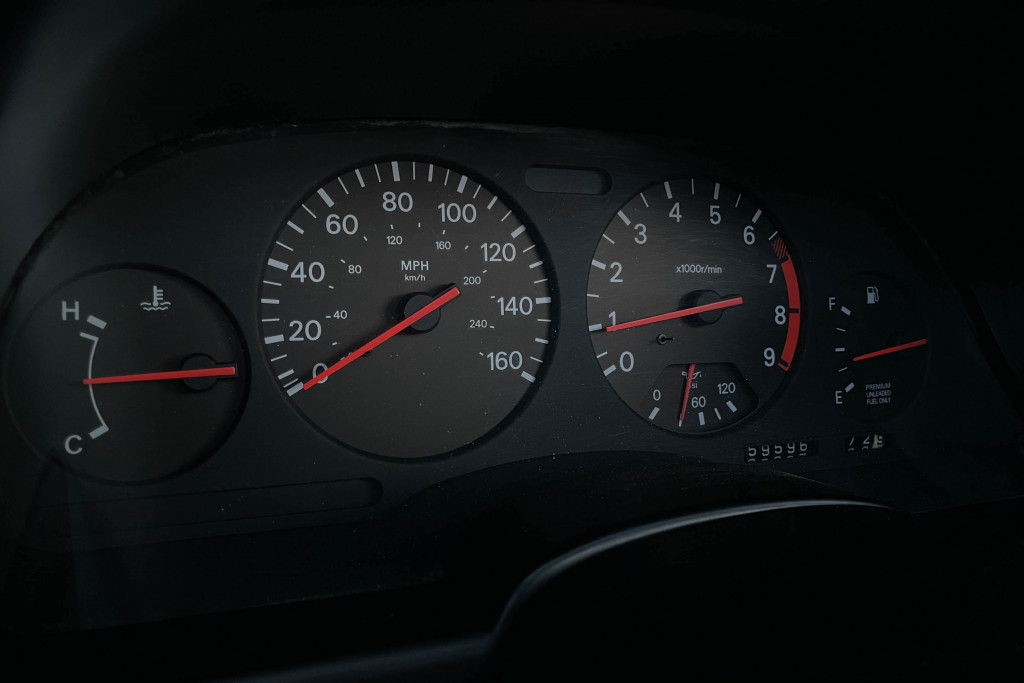
1990 Nissan 300ZX and 2023 Nissan Z I Photography by Allex Bellus Photography
Hit: Blending the old with the new
Nissan has done a good job of blending modern technology with analog controls. The standard 12.3-inch digital gauge cluster offers three easy-to-read layouts, one of which features a massive tachometer front and center with a digital speedometer next to it on the right. The “standard” layout is reminiscent of our 300ZX’s cluster, with white tach and speedometer numbers and red needles mounted above coolant temperature and fuel gauges. The new Z’s analog climate controls consist of three round knobs mounted low on the dashboard. In a nod to the 240, a pod of three analog gauges is mounted on the top of the dashboard angled toward the driver to display turbo boost, turbo speed, and battery voltage. Nissan also gives it a manual hand brake, which has become an endangered species these days. The heated seat controls are out of a parts bin that might have been sitting in the corner since 1999, but they are a delight to use with a satisfying click when engaged. Not everything has to be new and modern to delight.
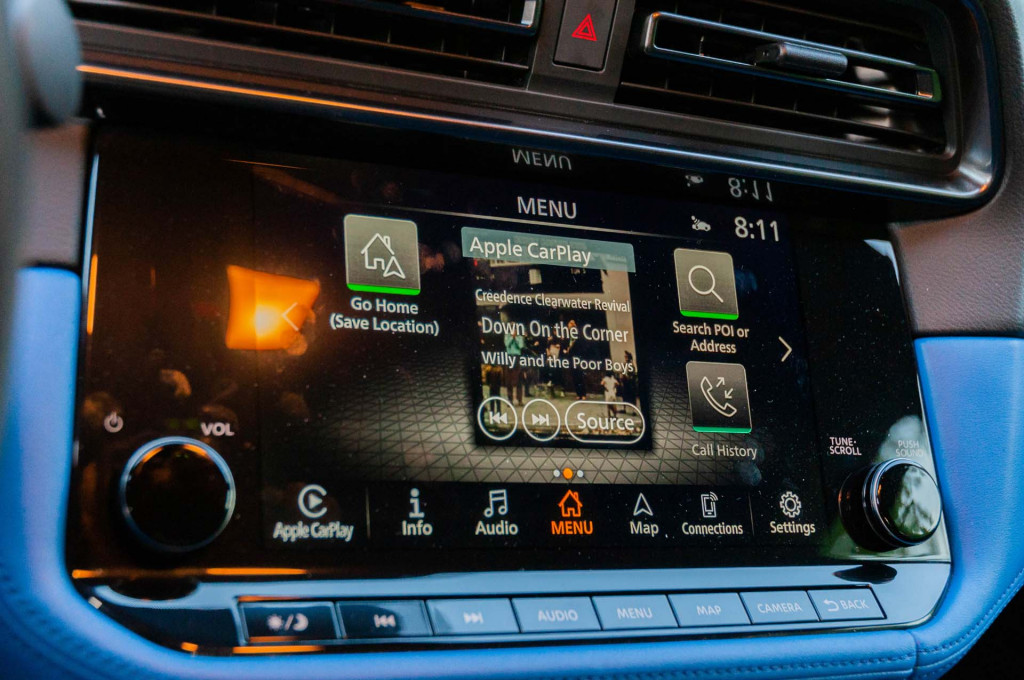
2023 Nissan Z
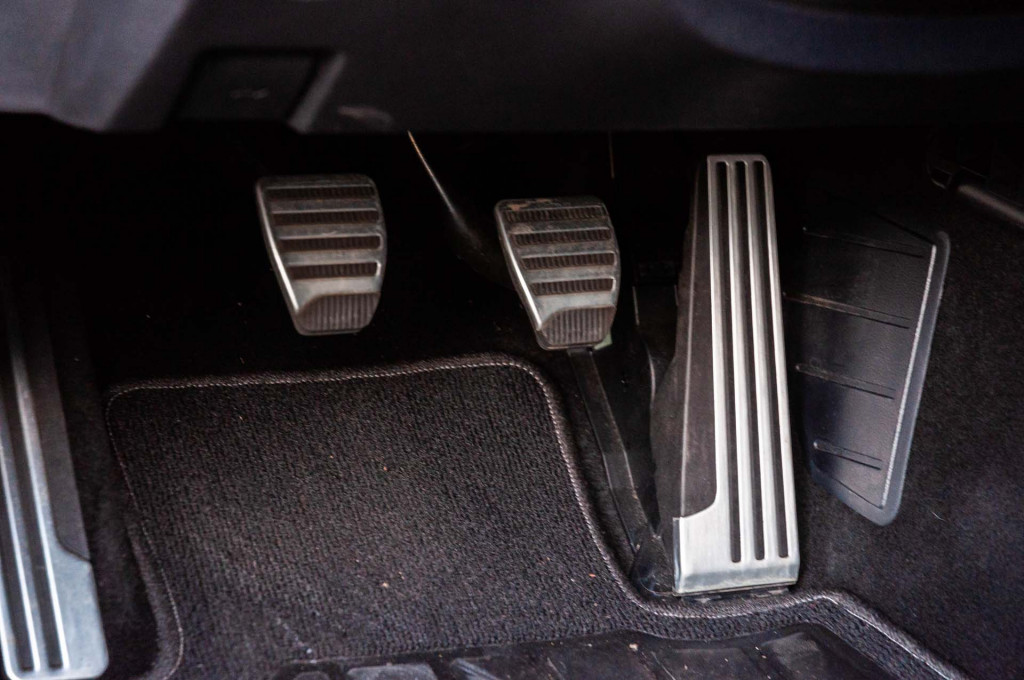
2023 Nissan Z
Miss: Comprises for cost
The Z isn’t Nissan’s U.S. flagship or halo vehicle anymore. Its justification for living is slim, and its 370Z roots create compromises. It lacks a head-up display, wireless smartphone charging despite Nissan offering all of them in the Rogue crossover SUV. The 9.0-inch touchscreen in my Performance model tester (base models have an 8.0-inch touchscreen) runs the automaker’s current software, which is saddled with a useless homescreen layout that can be fixed by Apple CarPlay. I’d prefer the 2023 Altima’s new interface, which is seemingly better on paper as its new tile-based interface appears to has a useful homescreen. The pedals haven’t moved and the brake pedal remains mounted higher than the throttle pedal, which isn’t ideal for heel-toe driving (though it’s possible, just hard and kind of uncomfortable).
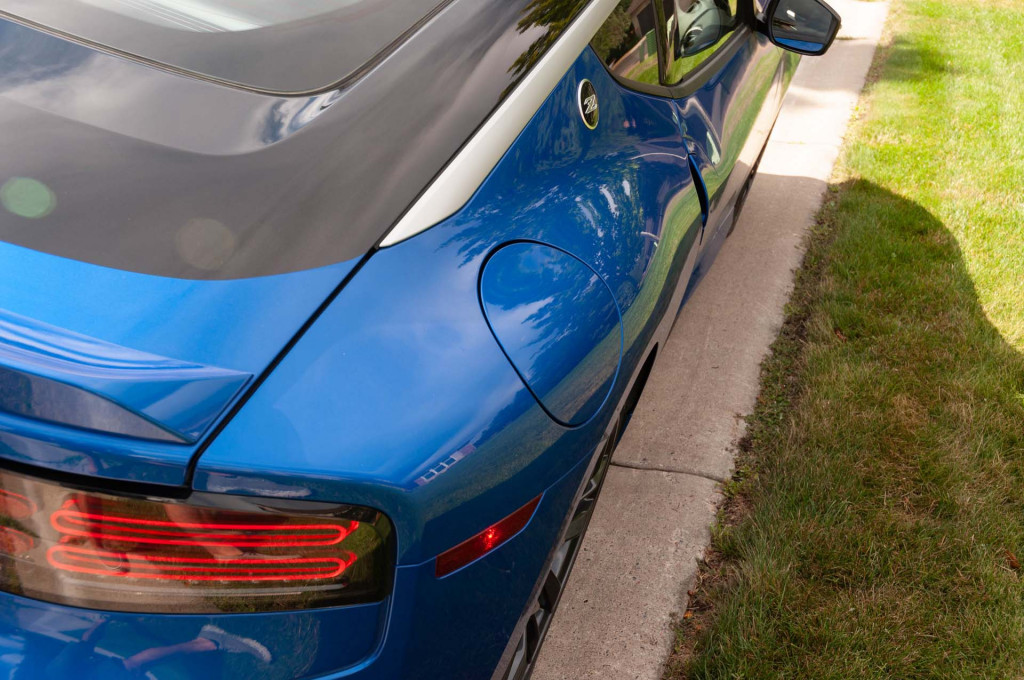
2023 Nissan Z
Traction control is either on or off, but there’s no in between for fun with a safety net. The fuel filler door is hilariously large. For scale, it’s larger than my outstretched hand. The fuel filler neck didn’t move from its position on the 370Z, but the Z’s hips grew significantly wider, which led to a massive fuel door, according to Nissan spokesperson Dan Passe. The weight distribution is still 55/45, which places a smidge too much weight up front, and it can be felt.
None of this really matters in the grand scheme of things, but each is a slight annoyance that for some will lead to a death by a thousand cuts when it comes time to choose a new Z or something else.
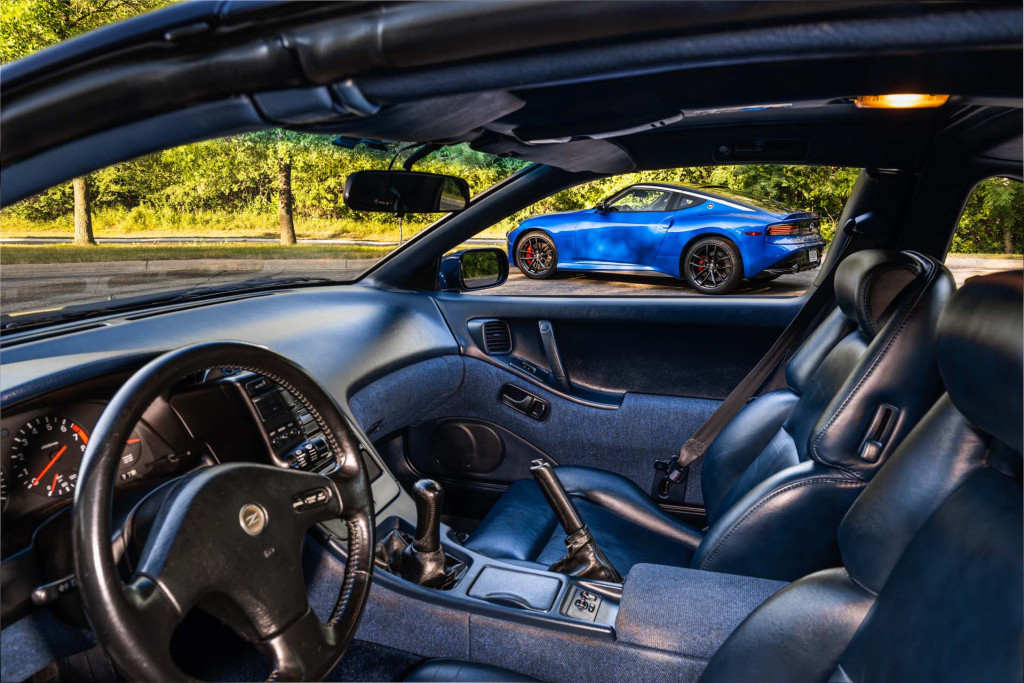
1990 Nissan 300ZX and 2023 Nissan Z I Photography by Allex Bellus Photography
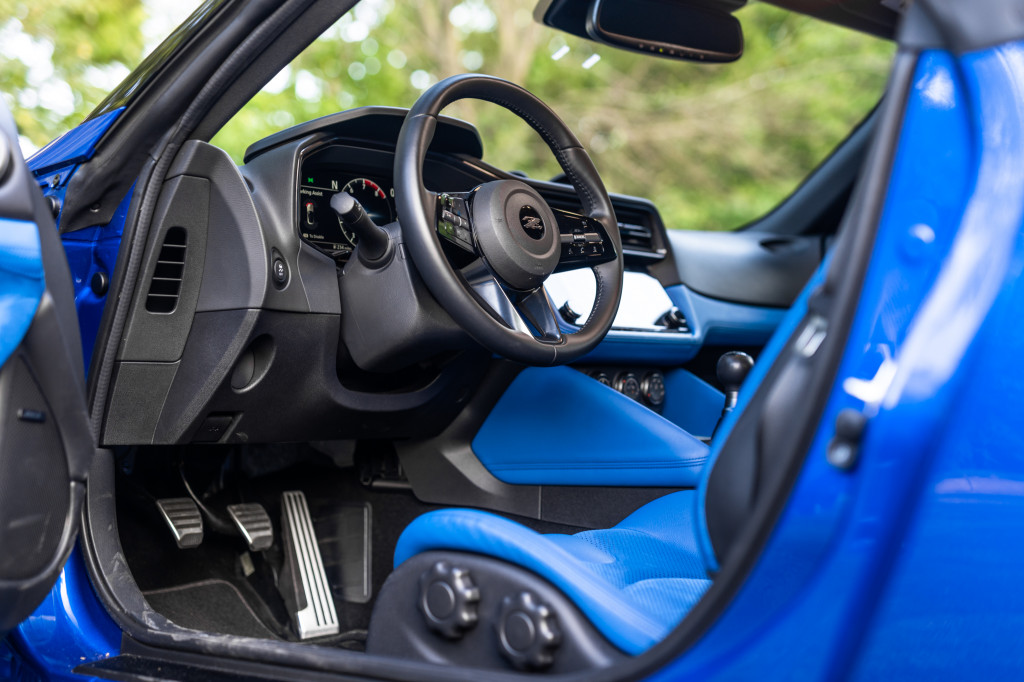
2023 Nissan Z I Photography by Allex Bellus Photography
Bonus hit: Blue-on-blue
The Z hasn’t been offered with a blue-on-blue color scheme, or a blue interior for that matter, since the ’90s. It was a thing in the earlier Zs as well. Kudos to Nissan for bringing back this spec. It’s done in a smart way: the controls and trim bits are all black, which makes them easier to replace (ask me how hard it is to find blue plastic trim from the ’90s), but the seats, lower dash panel, center console trim, and door panels all feature blue material. Nissan is one of few automakers that realize the world doesn’t need to just be black, gray, white, or tan. Bring back colors.

1990 Nissan 300ZX and 2023 Nissan Z
It’s not perfect, but the new Z is better than it needs to be. Nissan’s addressed the 370Z’s major issues and now I have a $50,000 problem. Suddenly, I have a burning desire to buy a car that is in no way practical for a family with two kids and a very smart wife, but I am destined by family history to buy one. Send help. Or a check.
––––––––––––––––––––––––––––––––––––––––––
2023 Nissan Z Performance
Base price: $41,015, including $1,025 destination
Price as tested: $53,210
Powertrain: 400-hp twin-turbo 3.0-liter V-6, 6-speed manual transmission, rear-wheel drive
EPA fuel economy: 18/24/20 mpg
The hits: Strong turbocharged power, revs like a naturally aspirated engine, looks great, better seats, analog meets digital, blue-on-blue option returns
The misses: Bridgestone Potenza tires, generic key, cost compromises, it isn’t practical or needed and my smart wife knows it
Special thanks to Alex Bellus, Jon Reyerson, and Dan Feder for their assistance.




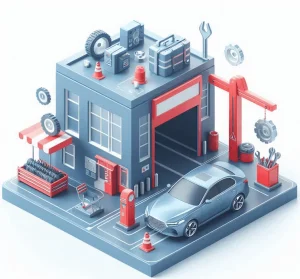
More Stories
Lewis Hamilton Shows Off New Helmet for Monaco GP by Daniel Arsham
Son parte de Star Wars los dos VW ID. Buzz muy especiales, e inspirados en “Obi-Wan Kenobi”
2022 Audi Q5 Sportback Review: Rounding out the top